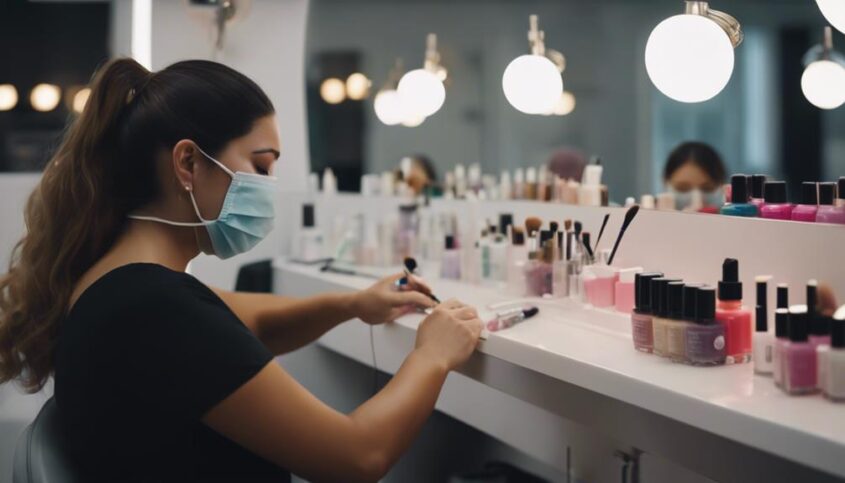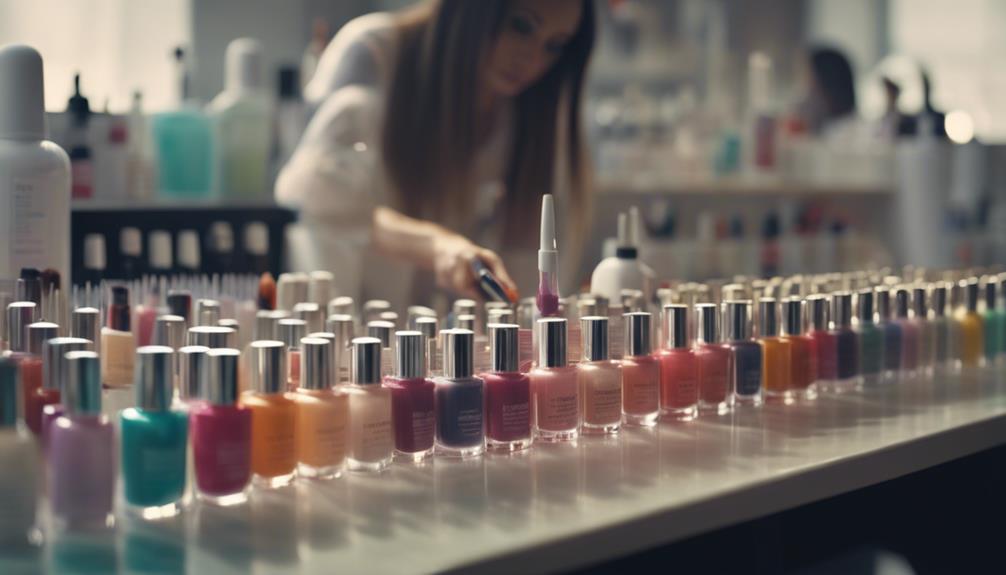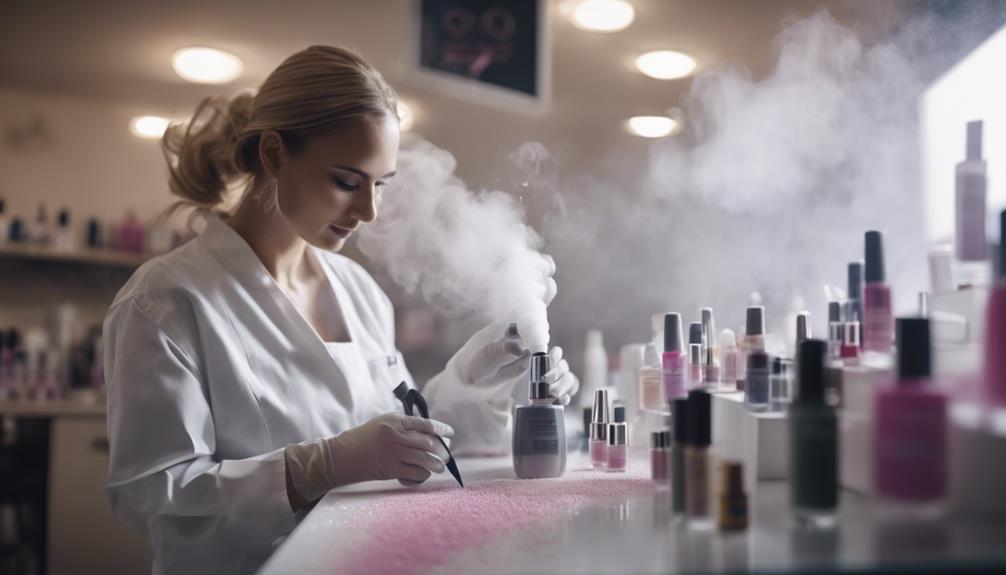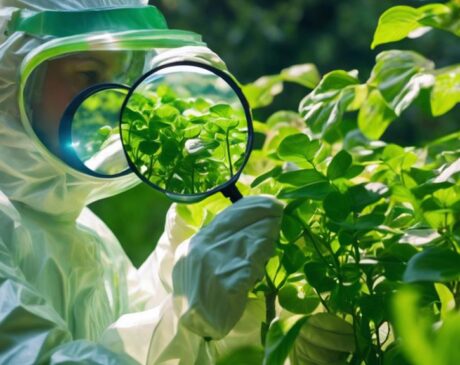Is Being a Nail Tech Bad for Your Lungs?

Working as a nail tech can expose you to harmful chemicals like formaldehyde and toluene, risking respiratory issues. Poorly ventilated salons exacerbate these dangers. Wear protective gear and maintain hygiene to reduce risks. Respiratory conditions such as asthma and bronchitis are prevalent among nail technicians. Ensure proper ventilation and use HEPA filters for cleaner air. Taking proactive steps to protect your lungs is crucial in this profession.
Key Takeaways
- Constant exposure to chemicals like formaldehyde and toluene can lead to respiratory issues.
- Nail technicians are at risk of developing occupational asthma and chronic bronchitis.
- Proper ventilation systems in salons are crucial for protecting lung health.
- Use of personal protective equipment like masks and gloves helps reduce chemical exposure.
- Implementing best practices like using low-VOC products can minimize lung-related risks.
Health Risks Associated With Nail Tech Work

Nail technicians are exposed to various health risks due to the chemicals and fumes present in nail products and the nature of their work environment. The constant exposure to chemicals like formaldehyde, toluene, and dibutyl phthalate can lead to respiratory issues, skin irritation, and long-term health concerns. Additionally, the confined space of nail salons can exacerbate these risks, as poor ventilation can result in a buildup of harmful fumes.
To mitigate these health risks, nail technicians should prioritize using personal protective equipment such as gloves and masks, as well as ensuring adequate ventilation in their workspaces. Implementing proper hygiene practices, such as regular handwashing and cleaning of tools, can also help reduce the risk of skin irritation and infections.
Innovations in nail product formulations, such as the development of low-odor and low-toxicity options, can also contribute to creating a safer work environment for nail technicians. By staying informed about the potential health risks and embracing innovative solutions, nail technicians can protect their well-being while pursuing their passion for nail care.
Common Chemical Exposures in Salons
Exposure to a variety of chemicals is a common occupational hazard faced by professionals working in salon environments. Nail technicians, in particular, are regularly exposed to substances like formaldehyde, toluene, and acetone, which are commonly found in nail polishes, removers, and other nail products. These chemicals are known to emit volatile organic compounds (VOCs) that can contribute to indoor air pollution and pose health risks to salon workers.
Additionally, hair stylists are exposed to chemicals present in hair dyes, straightening treatments, and hair sprays. These products often contain ammonia, hydrogen peroxide, and formaldehyde, among other potentially harmful substances. Continuous exposure to these chemicals can lead to various health issues, including respiratory problems, skin irritation, and allergic reactions.
Salon owners and workers should prioritize proper ventilation systems and the use of personal protective equipment to minimize chemical exposures. Innovations in salon products, such as the development of low-VOC formulations and safer alternatives, are crucial for creating healthier work environments in the beauty industry.
Respiratory Conditions Linked to Nail Technicians

Working as a nail technician has been associated with an increased risk of developing respiratory conditions due to prolonged exposure to harmful chemicals commonly used in nail products and treatments. The inhalation of these chemicals over time can lead to various respiratory issues, ranging from mild irritations to more severe conditions.
To illustrate the potential respiratory risks faced by nail technicians, the following table provides an overview of some common respiratory conditions linked to their profession:
| Respiratory Condition | Description | Symptoms |
|---|---|---|
| Occupational Asthma | Caused by exposure to workplace triggers | Wheezing, chest tightness |
| Chronic Bronchitis | Inflammation of the bronchial tubes | Coughing, shortness of breath |
| Occupational Rhinitis | Allergic reaction in the nasal passages | Runny nose, sneezing |
| Occupational Dermatitis | Skin condition triggered by workplace irritants | Itching, redness, swelling |
| Reactive Airways Dysfunction Syndrome | Bronchial hyperresponsiveness | Cough, chest tightness |
Nail technicians should be aware of these potential risks and take proactive measures to protect their respiratory health.
Best Practices for Lung Protection
Implementing proper ventilation systems in the workplace is crucial for safeguarding the respiratory health of nail technicians. By ensuring efficient airflow, harmful chemicals and particles released during nail treatments can be effectively removed from the air, reducing the risk of lung irritation and long-term respiratory issues. In addition to ventilation systems, wearing personal protective equipment such as masks can provide an extra layer of defense against inhaling potentially harmful substances.
Furthermore, regular maintenance of ventilation systems is essential to ensure their optimal functioning. Technological advancements in ventilation design, such as the use of HEPA filters and air purifiers, can further enhance air quality in nail salons, creating a safer environment for both technicians and clients. Collaboration with HVAC professionals can help nail salon owners customize ventilation solutions to meet the specific needs of their workspace.
Tips for Improving Indoor Air Quality

To enhance the quality of indoor air in nail salons, prioritizing regular maintenance of ventilation systems and utilizing advanced filtration technology is essential. Proper airflow and filtration systems can significantly reduce the concentration of harmful chemicals and particles in the air, creating a healthier environment for both nail technicians and clients. In addition to these foundational steps, here are some innovative tips for further improving indoor air quality:
- Invest in Air Purifiers: Consider installing air purifiers with HEPA filters to capture ultrafine particles and volatile organic compounds (VOCs) effectively.
- Use Low-VOC Products: Opt for nail polishes, adhesives, and other products with low volatile organic compound levels to minimize air contaminants.
- Promote Natural Ventilation: Encourage natural ventilation by opening windows and doors when possible to allow fresh air to circulate throughout the salon.
- Implement Greenery: Introduce indoor plants known for their air-purifying properties to help remove toxins and enhance indoor air quality.
Frequently Asked Questions
What Are the Long-Term Effects of Exposure to Chemicals in Nail Salons on Nail Technicians' Overall Health?
Exposure to chemicals in nail salons can have detrimental long-term effects on nail technicians' overall health. According to a study by the American Journal of Industrial Medicine, prolonged exposure may lead to respiratory issues, skin irritations, and other health concerns.
Are There Any Specific Lung Diseases or Conditions That Are More Common Among Nail Technicians Compared to the General Population?
Lung conditions prevalent among nail technicians compared to the general population may include asthma, chronic bronchitis, and occupational lung diseases due to exposure to chemicals in nail salons. Proper ventilation and protective measures are crucial to mitigate risks.
How Do the Risks of Lung Damage From Working as a Nail Tech Compare to Other Occupations That Involve Chemical Exposure?
When comparing lung damage risks between nail technicians and other chemical-exposed occupations, it is crucial to consider the specific chemicals, ventilation systems, and protective measures in place. Understanding these factors can help assess and mitigate potential health hazards effectively.
Are There Any Ways to Reduce the Risk of Lung Damage for Nail Technicians Beyond Wearing Masks and Improving Ventilation?
To enhance lung health for nail technicians, exploring advanced air purification systems, utilizing specialized ventilation technologies, and implementing regular air quality assessments can drastically reduce risks beyond conventional methods. Innovations in these areas hold promise for industry advancement.
Are There Any Alternative Career Options for Nail Technicians Concerned About the Impact on Their Lung Health?
For nail technicians concerned about lung health, exploring alternative career paths within the beauty industry like skincare specialist, makeup artist, or lash technician can offer a creative outlet while reducing exposure to harmful chemicals.




